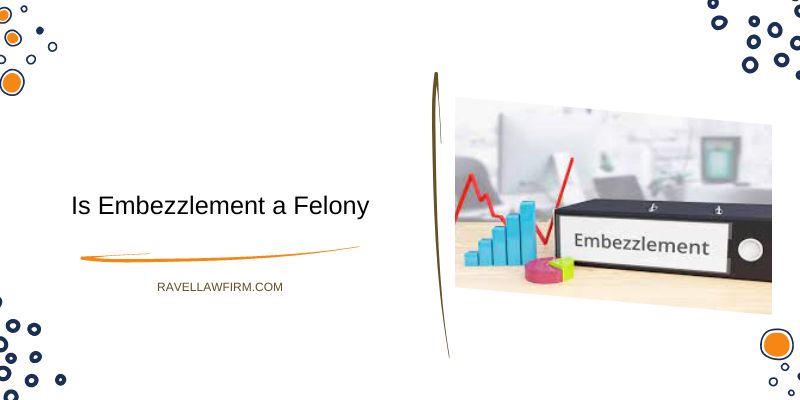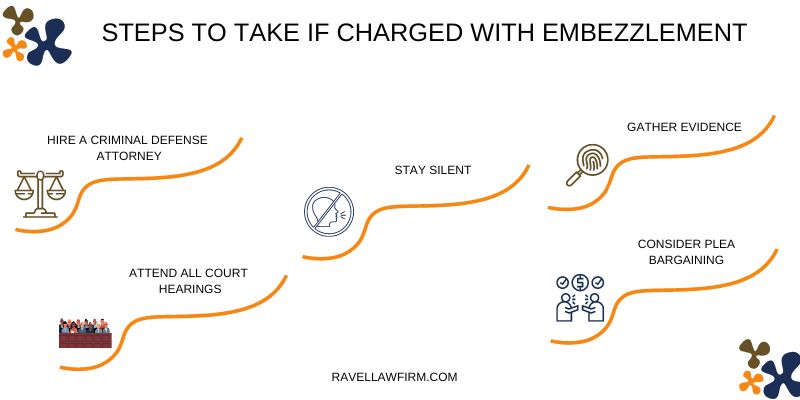Embezzlement is considered a form of white-collar crime, and can have serious legal consequences. But is embezzlement a felony? The answer is yes, in most cases. In fact, embezzlement is typically considered a felony offense, which can carry severe penalties such as imprisonment and hefty fines. Continue reading to find out more about embezzlement and what to do if you have been charged with it?

Is Embezzlement a Felony?
Embezzlement is a serious criminal offense and is typically considered a felony. Embezzlement occurs when a person who has been entrusted with money or property for safekeeping or management takes it for their own personal use or benefit without authorization. This can include stealing funds from a company, diverting funds from a nonprofit organization, or misusing funds from a government agency. The severity of the offense and the resulting penalty depend on the amount of money or property involved in the embezzlement.
In most cases, if the value of the funds or property taken exceeds a certain threshold, such as $1,000 or $10,000, the offense is considered a felony. A conviction for felony embezzlement can result in a substantial prison sentence, fines, and restitution to the victims. The severity of the punishment is meant to deter others from committing this type of crime and to ensure that those who engage in this behavior are held accountable for their actions.
Steps to Take If Charged with Embezzlement
Facing embezzlement charges can be a daunting experience, but it’s crucial to take swift action to protect your rights and build a strong defense. To get started, here are some essential steps you can take:
Hire a criminal defense attorney
Embezzlement charges are serious, and you need an experienced criminal defense attorney to represent you. Your attorney can review the evidence against you, advise you on the potential consequences of the charges, and work to build a strong defense on your behalf.
Stay silent
It is important to exercise your right to remain silent and avoid discussing the case with anyone except your attorney. Anything you say can be used against you in court, so it is important to avoid making any statements that could be incriminating.
Gather evidence
Your attorney will need to review all of the evidence in your case to build a strong defense. Be sure to gather any documents, emails, or other evidence that may be relevant to your case and provide them to your attorney.
Attend all court hearings
It is important to attend all scheduled court hearings and follow any orders from the court. Failing to appear in court can result in additional charges and a warrant for your arrest.
Consider plea bargaining
In some cases, it may be possible to negotiate a plea bargain with the prosecution. This can involve pleading guilty to a lesser offense in exchange for a reduced sentence. Remember that being charged with embezzlement does not mean you are guilty, and you have the right to a fair trial. Work closely with your attorney to build a strong defense and protect your rights.

How long can it Take to Get Rid of an Embezzlement Charge?
In some cases, an embezzlement charge may be dismissed early on in the legal process. For example, if the prosecution does not have sufficient evidence to support the charges, or if there are procedural errors in the investigation or prosecution of the case, the charges may be dismissed.
However, in other cases, it may take several months or even years to resolve an embezzlement charge. This is particularly true if the case goes to trial or if plea negotiations take a long time.
It is important to note that fighting an embezzlement charge can be a complex and time-consuming process. It is essential to have the assistance of an experienced criminal defense attorney who can help you understand your legal options, negotiate with prosecutors, and mount a strong defense on your behalf. Your attorney can also help you navigate the legal system and work to get your charges dismissed or reduced as quickly as possible.
Embezzlement Statute of Limitations
The statute of limitations for embezzlement can vary depending on the jurisdiction and the amount of money or property involved in the crime. The statute of limitations is the time limit within which criminal charges must be filed against a defendant. After the statute of limitations has expired, the prosecution is typically barred from pursuing criminal charges.
In general, the statute of limitations for embezzlement ranges from one to six years. In some jurisdictions, the statute of limitations may be longer for embezzlement of larger amounts of money or property. For example, in California, the statute of limitations for embezzlement ranges from three to six years depending on the amount embezzled.
Also See: What Is Racketeering Charges
FAQ’s
What makes embezzlement a federal crime?
According to federal law, embezzlement can result in prosecution for theft of public funds or property, theft by public servants, or theft of cash from a bank or other financial institution.
What is the difference between embezzlement and stealing?
Taking someone else’s things or money without their consent is referred to as stealing. Contrarily, embezzlement is the misuse of money given to you for safeguarding.
How much money is considered a federal offense?
A sum of around $1000 is considered as a federal offence.

Hi, I’m Brian Gary; I have my Doctor of Juridical Science (SJD) degree from SMU Dedman School of Law in Dallas. Over the years, I have dealt with many families and successful corporate Legal cases. I have counseled many people on legal matters, and along with my profession, I write about Law on my blog. Please feel free to contact me for counseling/case discussion; I’ll be happy to help you.